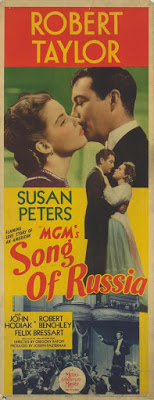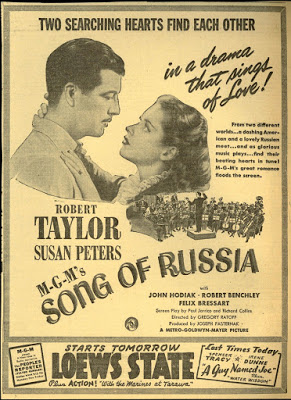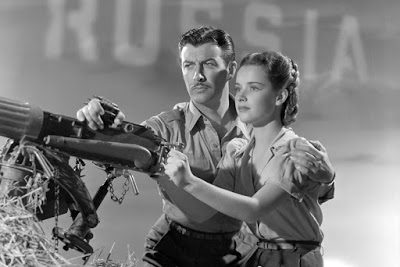Song of Russia

Director: Gregory Ratoff
Year:
1944
Rating: 5.5
Song of Russia made in 1944 was in many ways a typical fluffy musical romance
with a good dollop of patriotic anti-Nazi propaganda thrown in that is actually
fairly effective. But the problem is that it was effective pro-Russian propaganda
and that is what has made this film historically of interest. It was made
in 1944 while the USA was in an alliance with Russia to defeat Germany -
which included sending them a lot of material aid. Roosevelt asked the studio
heads to please make films that put Russia in a good light and under that
pressure a few studios complied - Warner's with Mission to Moscow; Samuel
Goldwyn Studios with The North Star and MGM with this film. Fine and dandy.
It did ok at the box office.
It starred studio hunk Robert Taylor as a classical conductor who loves Russian
music so much that he sets up a tour in Russia in 1941. He meets a lovely
female villager (Susan Peters who is very sweet in this film and sadly was
paralyzed in a hunting accident a year later) who is a whiz on the piano
and later on teaches young'uns how to make a Molotov cocktail. They quickly
fall in love - see the sights of Moscow (cut to stock footage) and then visit
her farming village. Russia is wonderful. Everyone is so happy, statues of
Lenin and Stalin look over them with loving care, song is heard everywhere
even on the communes as they work. Life is idyllic. They marry. Germany invades
and it all goes to Hell. When it comes to the Nazis you even have to root
for the Russians. A decent little film with a lot of Tchaikovsky everywhere.
The film finishes its run and is put back into the vaults of obscurity. Or
so it seems.
The war ends and about 15 minutes later we are in a Cold War with the Soviet
Union. The Iron Curtain came down with a clang as Churchill warned in 1946.
Suddenly the Soviet Union was our enemy and Communism was evil and Germany
was our good buddy. This atmosphere led to the HUAC Congressional hearings
in 1947 in which American Communist sympathizers were to be rooted out of
every industry including Hollywood. So, many of the denizens of Hollywood
were brought in to testify and to either prove they were not Communists or
to name names if they were. Like our politicians of today, they believed
that nothing could boost their ambitions like a good old fashioned investigation
that ruined many innocent people.
Song of Russia which had been requested by FDR, who was of course dead now,
came in for special attention because of its favorable depiction of life
under Communism when Russia was doing most of the fighting and dying to defeat
the Nazis. It didn't help that the two writers of the script were Communists.
Paul Jarrico was blacklisted and Richard Collins ended up giving up names.
Robert Taylor was brought in and asserted that he knew nothing, that he was
not a Communist and he named names. He swore to never work in a film again
if there was even one Communist involved. Then there was the cretin Ayn Rand
who came with one target in mind - Song of Russia. She condemned the film
as subversive, sympathetic to Communism and to show a false face. All this
for a film that pretty much every one had forgotten or even more likely never
seen.



